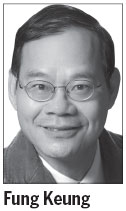HK citizens and mainland immigrants live in harmony
Updated: 2012-12-14 07:39
By Victor Fung Keung(HK Edition)
|
|||||||||

The University of Hong Kong released a survey on Dec 4, revealing that about one-quarter of mainland immigrants have experienced discrimination, including 17 percent who said they have been treated rudely and 10 percent insulted.
This is heart-rending news indeed, as we know Hong Kong people cherish living in harmony, both with family members, neighbors and people in the community.
Long-time Hong Kong residents and newly-arrived mainland immigrants should try a bit harder to respect each other, help one another and live together in harmony. Embedded dislike will lead us nowhere.
Every year, about 52,000 one-way permit holders immigrate legally to Hong Kong from the mainland. Some find decent jobs, but others may have to live on government subsidies. Some Hong Kong citizens may feel that these needy people are taking advantage of the city's generous welfare policies and thinning society's resources.
In other words, some disgruntled local people may feel that the fruits of their years of hard labor are being scooped up or free-loaded by mainland immigrants who have yet to make a contribution to the city's growth, development and prosperity.
This negative feeling has been exacerbated recently by the day traders in the border town of Sheung Shui, where mainland masterminds hire day traders to buy up daily necessities in Hong Kong such as baby milk powder, and reselling them on the mainland markets to make a fast buck. Many local Sheung Shui residents were left in the lurch. We can't blame the Sheung Shui residents for their bitterness.
To make things worse, local property prices have hit the roof, partly because of aggressive buying by wealthy people from the mainland. Some local people can't afford the skyrocketing prices to own an apartment and they channel their frustrations towards mainland investors. The Hong Kong government recently has imposed a special tax on transactions if the buyers are not permanent Hong Kong residents. Property prices, however, have shown no signs of slackening.
In 2011, about 93,000 babies were born in Hong Kong. Many of these babies were born to mainland women who either had prior appointments with local private hospitals or sneaked into Hong Kong illegally and crashed into government hospitals' emergency rooms, when their babies were due. Many local moms-to-be feared that baby delivery services would be hijacked by pregnant women from the mainland.
These mainland women who illegally sneaked into Hong Kong might be charged by the Immigration Department and repatriated to the mainland, but their sons and daughters would become Hong Kong citizens because they were born in the city. They can enjoy free education and other social benefits subsidized with taxpayers' money, should they live in Hong Kong and go to school here.
Antipathy among Hong Kong people won't disappear overnight. But Hong Kong people shouldn't feel bad about mainland immigrants or babies born in Hong Kong to mainland mothers, because we need them. The Census and Statistics Department forecasts that Hong Kong's population would reach 8.47 million by 2041. That's up 19 percent from today's 7.13 million. Our robust economy requires a steady and stable working population. The indigenous local population is aging fast and mainland immigrants and babies born to mainland mothers will help fill the void.
Locally-born citizens should take a longer, broader and more liberal view toward mainland immigrants and stop discriminating against them. The last thing we want is to instill a "we-they" kind of divide, which would do nobody any good. Let us all live in harmony and respect each other. Just like the Beijing Olympic theme song states: "You and me, from one world, we are family."
The author is coordinator of the B.S.Sc in financial journalism program at Hong Kong Baptist University.
(HK Edition 12/14/2012 page3)